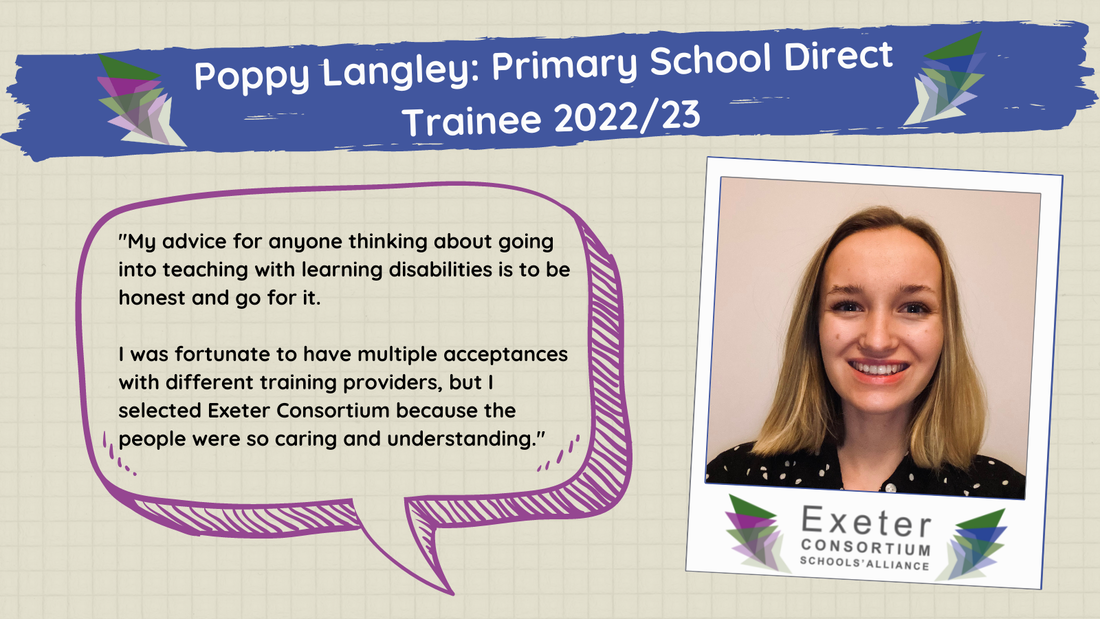|
Dyslexia is my teaching superpower. It took me a while to believe this but now it is my driving force in being the teacher I always needed as a child.
Whilst completing my undergraduate degree in childhood studies, I decided I wanted to train as a teacher. Since a child I have always wanted to be a teacher but was afraid that my dyslexia and auditory processing disorder would stop me. I met a teacher at a wedding during the second year of my degree and, when I explained my worries, he disclosed that he was also dyslexic but is still thriving as a teacher. We stayed in contact, and he helped me with my application and interview for each training provider during the final year of my degree. I have always been very honest about my dyslexia, but people have very different understandings of what it means. I can read very well and do not see letters the wrong way round. However, I don’t know left from right, I struggle to remember instructions, and my spelling is awful. As I also have auditory processing disorder this means I often mishear people, pronounce words incorrectly and hate loud environments, something which is impossible to avoid in a classroom with 30 six-year-olds! My dyslexia had never been such a barrier as it was during teacher training. Throughout my teenage years into my twenties, I have always used technology. Siri is my best friend; I simply say a word into my phone or watch and the word appears ready for me to copy. Throughout my degree my mum read every essay to proofread it for me. Spell check is great, but I often spell a correct word which is not the word I meant to type. Yet in class neither Siri nor my mum are there to help me spell in front of 30 children. Thirty little eyes staring at me, as I attempt to write down their sentences on the board. It brought back some awful memories from school where I was asked to write on the whiteboard with the whole class laughing as I struggled to spell basic words. I came home from my first day on placement and thought ‘I can’t do this’. I spent the first week crying every day ready to quit, but I loved the children and didn’t want to leave them. I came up with my own strategies. I would always write any words I will need for the day on a post-it note and stick it to my lanyard (asking Siri first of course). I also pre-read any books to myself and ask someone how to say a word I’m unsure of and then phonetically write the word for myself so I remember how to say it. However, this still wasn’t enough; the children would call out amazing vocabulary during English and I wouldn’t be able to write it on the board. I’m sure many people are thinking, just use a dictionary! But when you don’t know what letter the word starts with they are useless. This is when I realised that I needed some extra help. I spoke to my amazing training providers about my struggles, and they really supported me. They allowed me to find a great e-reader pen and purchased it for me as well as encouraging me to speak to my class about my dyslexia. I was able to find a great book which explains dyslexia to small children. My class teacher was great and understands that I can’t cope with lots of instructions all at once so allows me time to write them down. She also will often tell me that I’ve missed a letter out of words I have written on the board. I need someone to act as a spot checker for me. I can spell the word ‘what’, yet I will often write it on the board and forget a letter but not realise. This has created not just a supportive relationship for us but also for all the children. They love when I spell something wrong, and they can correct it. They are more empathetic to their peers. To children, their teachers are geniuses; they can see that I’m a clever person I just struggle with some things but that doesn’t take away from my intelligence and they can now see that in their peers. It was challenging to explain my spelling difficulties to the children. I can’t learn new spellings. One assumption of dyslexia is that I am just not trying hard enough. I went to spelling intervention throughout school, one year I took a spelling test at the beginning and the end of the year. I got worse, I scored two less than the start of the year. A whole year spent playing spelling games for an hour a week and I hadn’t improved at all, in fact I’d seemingly got worse. I do not spell words the same way every time, sometimes I’m lucky and get the letters in the correct order but if I were to spell the word minutes later it could be wrong. I simply cannot learn new spellings without incredible struggle. How can I say this to my class and yet expect them to listen to me bang on about spelling rules? I explained to them that I had to work doubly hard throughout my education and that I am still learning now. My ‘magic pen’ has provided me with more independence. I no longer have to ask some how to read a word, instead I simply glide the pen over the word, and it reads aloud to me. I also have words stored in the pen. I change them every few weeks depending on what I am teaching. I still rely on the use a dyslexic dictionary and if all else fails, I return to Siri on my smart watch. As I have built my confidence around talking so openly about my dyslexia, I am also more open speaking to other teachers. My experience of teachers was that very few understood dyslexia and assumed I wasn’t very intelligent. I only left school myself five years ago and so I can only imagine that many teachers still hold the same assumptions. I will never stop contradicting these believes and advocating for these children. I hope that when someone I’ve taught is later diagnosed with dyslexia, they can think of me and understand that you can do anything, with hard work and the help from some technology. My advice for anyone thinking about going into teaching with learning disabilities is to be honest and go for it. I was fortunate to have multiple acceptances with different training providers, but I selected Exeter Consortium because the people were so caring and understanding. You need to be in a place where you can be honest and know you will receive support. It is hard work, but it is so worth it.
0 Comments
Tuesday 7th March | 09:30 - 13:30 | Countess Wear Community School
This course will enable staff to explore the differences for many young female students who are on the autistic spectrum. Course Aims: - Identify how differences in social imagination and communication and interaction can be gender specific. - Consider concepts such as "masking", and comorbidities such as selective mutism, eating disorders and OCD often present. - Explore the prevalence of mental health difficulties for many of the students. Cost: £45 per person for SWIFT member schools | £75 per person for non-members Tuesday 28th February | 09:30 - 12:30 | Online
This workshop will provide attendees with an understanding of common mental health difficulties, including main symptoms, and provide ideas from a variety of psychological therapies that can be used to support ourselves to bolster our resilience and improve our wellbeing. These strategies along with additional ideas will then be presented to support those that you work with, line manage or support. The training will help you to feel more confident in having open, safe and honest conversations around mental wellbeing, have knowledge to signpost colleagues to appropriate avenues, and feel more comfortable with suggesting strategies to others, or use yourself. About the Trainer Dr Karen Kershaw, Clinical Lead for Specialist Assessments specialises in providing psychological support services to children in care, adopted children and their families. Cost: £35 for SWIFT member schools | £55 for other colleagues We are delighted to be working with Life Chance Education to offer six new courses relating to Trauma, SEND and Mental Health during the 2022-23 academic year. More information can be found at the link below.
The link between Physical & Emotional Wellbeing Wednesday 25th January 2023, 2.00pm - 4.30pm, Countess Wear Community School Introduction to Mental Health Wednesday 15th March 2023, 2.00pm - 4.30pm, Countess Wear Community School Trauma-Friendly Transitions: supporting all pupils to manage change Wednesday 17th May 2023, 2.00pm - 4.30pm, Countess Wear Community School The Impact of Caring Wednesday 21st June 2023, 2.00pm - 4.30pm, Countess Wear Community School Thursday 2nd February | 09:30 - 12:00 | Online
SIMS Training for New Users, 09:30 - 10:30 This session will teach you the skills necessary to use SIMS in a school office environment. Session Objectives – To raise awareness of the effective use of SIMS for new users to SIMS – Refresh knowledge of SIMS to include updates SIMS Training for Experienced Users, 11:00 - 12:00 This session will teach you the skills necessary to use SIMS in a school office environment. Session Objectives – To raise awareness of accessing pupil/student information through SIMS Reporting – Provide hints and tips, shortcuts Cost: £25 per person for SWIFT member schools | £50 per person for non-members. |
Categories
All
Archives
July 2024
|


 RSS Feed
RSS Feed


